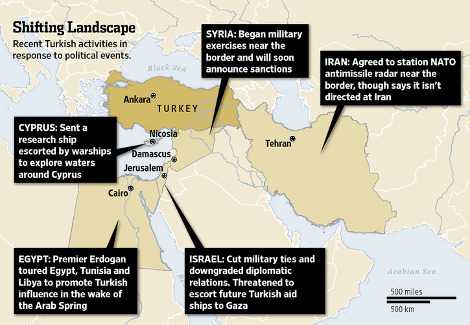By JAY SOLOMON in Washington and MARC CHAMPION in Istanbul
WASHINGTON—Escalating tensions in the Mediterranean are complicating the U.S.-Turkey alliance at a time when President Barack Obama views Ankara as central to helping the U.S. manage the Middle East’s political upheavals.

Secretary of State Hillary Clinton privately has pressed Turkish officials to back off from their threats to send warships to waters around Cyprus in a dispute over energy deposits, according to U.S. officials. The top American diplomat cautioned that any escalation could jeopardize U.S. interests in the Mediterranean, as the gas fields are being jointly developed by Cyprus and Houston-based Noble Energy Inc.
U.S. officials also are concerned by Turkish threats to deploy naval vessels to accompany flotillas headed to the Palestinian territories, which could heighten the potential for a military conflict between Turkey and Israel, both close U.S. allies. American diplomats have worked to broker a rapprochement between Turkey and Israel, but officials in the White House and State Department acknowledge the rift could endure.
Some strategists in Washington and Europe are calling on the Obama administration to lay down stricter red lines in the Mediterranean, by using more aggressive diplomacy and the U.S. Navy. This is seen as crucial for guarding against any miscalculations by Turkey, Israel or Cyprus, though they acknowledge such steps could anger Ankara.
“I don’t think the Turks are intent on starting hostilities, but you never know what can happen in this environment,” said Morton Abramowitz, a former U.S. ambassador to Turkey. He added that Washington needs to be up-front with Ankara and tell them that if conflict breaks out between Turkey and Israel, “We’ll choose Israel.”
Turkish officials stressed in interviews they aren’t seeking a war with either Cyprus or Israel, and said Turkey has been forced to take action to guard against provocative steps by others. “Look, nobody wants any disasters here. We are aware of the situation,” said a senior Turkish official.
Mr. Obama has cultivated Turkey as a major strategic partner since coming into office in 2009. White House officials say the U.S. president speaks regularly with Turkish Prime Minister Recep Tayyip Erdogan to coordinate on the political transformation in the Middle East and North Africa. And the Obama administration hailed Ankara’s decision last month to house a North Atlantic Treaty Organization radar facility, which is focused on Iran’s long-range missiles.
“Turkey is a NATO ally, a great friend and a partner on a whole host of issues,” Mr. Obama said prior to a meeting with Mr. Erdogan last month.
Still, the deepening dispute between Turkey and Cyprus over energy exploration has placed Washington squarely in the middle.
Tensions flared last month when the Cypriot government announced that Noble Energy would begin drilling for gas in its Exclusive Economic Zone. Ankara doesn’t recognize Cyprus’s government and said the energy exploration undercuts prospects for a United Nations-backed process aimed at reunifying the island. Cyprus was divided into ethnic-Greek and Turkish enclaves in 1974, after Turkey invaded the island following a Greece-inspired coup.
In recent weeks, Turkey has dispatched naval vessels into this economic zone, including frigates and gunboats, according to senior Cypriot officials. They said these moves are a violation of international law and aimed at intimidating Cyprus and preventing Noble from moving ahead with developing the gas fields. Cyprus’s government is calling on the U.N, U.S. and European Union to increase pressure on Ankara to pull out of Cypriot waters.
“The gravity of the problem stems from the threats that are being voiced, nearly daily, by the Turkish leadership,” said Cypriot Foreign Minister Erato Kozakou-Marcoullis, in an interview.
Turkish officials said the international community should be focused on the Cypriot actions, which they believe are aimed at undermining the U.N. talks.
More recently, Turkey also began exploring for energy deposits in Cypriot waters. “We just need to make a point… to show the Greek Cypriots that they don’t own the whole island,” said the Turkish official.
Continuing tensions between Turkey and Israel are also undercutting U.S. efforts to stabilize the Middle East. Once close allies, Turkey and Israel have been locked in a growing war of words in the wake of Israel’s military action last year against an international aid flotilla headed for the Gaza Strip. The operation killed eight Turkish nationals and one Turkish-American.
For months, the Obama administration has worked to ease tensions between Israel and Turkey. But the process broke down after Prime Minister Benjamin Netanyahu’s government refused to apologize to Ankara for the flotilla deaths. Turkey cut military ties with Israel and downgraded diplomatic relations, saying it would use its navy to protect future aid flotillas headed toward Gaza.
On Friday, Foreign Minister Ahmet Davatoglu reiterated that threat, but specified that it applied to Turkish vessels in international waters.
Some Turkey analysts believe Mr. Erdogan is bluffing. But there are increasing fears that the Turkish leader, now among the most popular in the Muslim world, could have staked a position that will be hard to back away from. And they note that Washington would be likely be dragged into any conflict.
“At some point, the U.S. is going to have to say: This rhetoric is too much,” said Henri Barkey, a Turkey scholar at Lehigh University.
Write to Jay Solomon at jay.solomon@wsj.com and Marc Champion at marc.champion@wsj.com